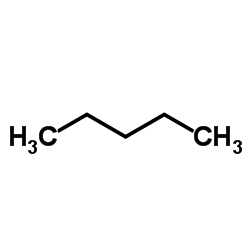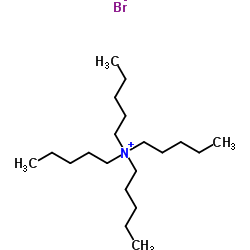621-77-2
| 中文名 | 三戊胺 |
|---|---|
| 英文名 | triamylamine |
| 中文别名 | 三正戊胺 |
| 英文别名 |
Triamylamine mixed isomers
MFCD00015270 tripenetyl-amine N,N-Dipentylpentan-1-amine tripentylamine TRI-N-AMYLAMINE Triandrous n,n-dipentyl-1-pentanamin N,N-Dipentyl-1-pentanamine N,N-Dipentylpentan-1-amin EINECS 210-705-7 TRI-N-PENTYLAMINE Tripentylamin |
| 密度 | 0.8±0.1 g/cm3 |
|---|---|
| 沸点 | 242.5±0.0 °C at 760 mmHg |
| 分子式 | C15H33N |
| 分子量 | 227.429 |
| 闪点 | 97.8±0.0 °C |
| 精确质量 | 227.261307 |
| PSA | 3.24000 |
| LogP | 6.44 |
| 外观性状 | 透明至黄色液体 |
| 蒸汽压 | 0.0±0.4 mmHg at 25°C |
| 折射率 | 1.444 |
| 储存条件 | 存放在密封容器内,并放在阴凉,干燥处。 |
| 稳定性 | 远离强氧化剂,强酸。具有叔胺的化学性质。加热时能溶解石蜡、巴西棕榈蜡,但冷却时固化。 |
| 分子结构 | 1、 摩尔折射率:75.26 2、 摩尔体积(cm3/mol):283.3 3、 等张比容(90.2K):654.6 4、 表面张力(dyne/cm):28.4 5、 极化率(10-24cm3):29.83 |
| 计算化学 | 1.疏水参数计算参考值(XlogP):5.6 2.氢键供体数量:0 3.氢键受体数量:1 4.可旋转化学键数量:12 5.互变异构体数量:无 6.拓扑分子极性表面积3.2 7.重原子数量:16 8.表面电荷:0 9.复杂度:98.8 10.同位素原子数量:0 11.确定原子立构中心数量:0 12.不确定原子立构中心数量:0 13.确定化学键立构中心数量:0 14.不确定化学键立构中心数量:0 15.共价键单元数量:1 |
| 更多 | 1. 性状:无色或浅黄色透明液体。 2. 密度(g/mL,20/4℃):0.7907 3. 沸点(ºC,1.87kPa):130 4. 折射率(20ºC):1.4367 5. 黏度(mPa·s,20ºC):1.264 6.闪点(ºC):102 7. 折射率:1.436 8. 蒸气压(kPa,26ºC):0.93 9. 蒸发热(KJ/kg): 330.7 10. 比热容(KJ/(kg·K) ,16ºC,定压): 2.14 11.体膨胀系数(K-1):0.00091 12.溶解性:不溶于水和甲醇,能与乙醇、乙醚、丙酮、乙酸乙酯、脂肪烃、芳香烃、固态油、矿物油、油酸、硬脂酸等混溶。 |
Synonym:Tri-n-amylamine Section 2 - COMPOSITION, INFORMATION ON INGREDIENTS
Risk Phrases: None Listed. Section 3 - HAZARDS IDENTIFICATION EMERGENCY OVERVIEW
Not available. Potential Health Effects Eye: Causes eye burns. Low vapor concentrations may cause a temporary visual disturbance known as 'blue haze' or 'halo vision'. Skin: Harmful if absorbed through the skin. Causes skin burns. Causes symptoms similar to those of inhalation. Amines have been known to cause skin irritation and sensitization. Ingestion: May cause severe irritation of the digestive tract. Ingestion may cause headache, nausea, and vomiting. Inhalation: Causes respiratory tract irritation. May cause pulmonary edema and severe respiratory disturbances. May cause central nervous system effects such as nausea and headache. Chronic: Chronic exposure may cause effects similar to those of acute exposure. Section 4 - FIRST AID MEASURES Eyes: Flush eyes with plenty of water for at least 15 minutes, occasionally lifting the upper and lower eyelids. Get medical aid. Skin: Get medical aid. Flush skin with plenty of water for at least 15 minutes while removing contaminated clothing and shoes. Ingestion: If victim is conscious and alert, give 2-4 cupfuls of milk or water. Never give anything by mouth to an unconscious person. Get medical aid. Inhalation: Remove from exposure and move to fresh air immediately. If not breathing, give artificial respiration. If breathing is difficult, give oxygen. Get medical aid. Notes to Physician: Section 5 - FIRE FIGHTING MEASURES General Information: As in any fire, wear a self-contained breathing apparatus in pressure-demand, MSHA/NIOSH (approved or equivalent), and full protective gear. Use water spray to keep fire-exposed containers cool. Combustible liquid and vapor. Approach fire from upwind to avoid hazardous vapors and toxic decomposition products. Extinguishing Media: Water or foam may cause frothing. Use water spray, dry chemical, carbon dioxide, or chemical foam. Section 6 - ACCIDENTAL RELEASE MEASURES General Information: Use proper personal protective equipment as indicated in Section 8. Spills/Leaks: Absorb spill with inert material (e.g. vermiculite, sand or earth), then place in suitable container. Remove all sources of ignition. Provide ventilation. Section 7 - HANDLING and STORAGE Handling: Wash thoroughly after handling. Remove contaminated clothing and wash before reuse. Use with adequate ventilation. Do not get in eyes, on skin, or on clothing. Keep container tightly closed. Keep away from heat and flame. Do not breathe vapor or mist. Storage: Keep away from sources of ignition. Store in a cool, dry place. Store in a tightly closed container. Section 8 - EXPOSURE CONTROLS, PERSONAL PROTECTION Engineering Controls: Facilities storing or utilizing this material should be equipped with an eyewash facility and a safety shower. Use process enclosure, local exhaust ventilation, or other engineering controls to control airborne levels. Use a corrosion-resistant ventilation system. Exposure Limits CAS# 621-77-2: Personal Protective Equipment Eyes: Wear chemical splash goggles. Skin: Wear appropriate protective gloves to prevent skin exposure. Clothing: Wear appropriate protective clothing to prevent skin exposure. Respirators: Follow the OSHA respirator regulations found in 29 CFR 1910.134 or European Standard EN 149. Use a NIOSH/MSHA or European Standard EN 149 approved respirator if exposure limits are exceeded or if irritation or other symptoms are experienced. Section 9 - PHYSICAL AND CHEMICAL PROPERTIES Physical State: Liquid Color: clear, colorless to pale yellow Odor: ammonia-like pH: Not available. Vapor Pressure: 0.03 mm Hg @ 20 deg C Viscosity: Not available. Boiling Point: 240 deg C @ 760 mm Hg Freezing/Melting Point: Not available. Autoignition Temperature: Not available. Flash Point: 91 deg C ( 195.80 deg F) Explosion Limits, lower: Not available. Explosion Limits, upper: Not available. Decomposition Temperature: Solubility in water: slightly soluble in water Specific Gravity/Density: 0.7907 Molecular Formula: C15H33N Molecular Weight: 227.43 Section 10 - STABILITY AND REACTIVITY Chemical Stability: Stable under normal temperatures and pressures. Amines absorb carbon dioxide from the air to form carbamate salts. Conditions to Avoid: Ignition sources, excess heat, Many amines are corrosive to copper, copper alloys (e.g. brass), aluminum, zinc, zinc alloys, galvanized surfaces.. Incompatibilities with Other Materials: Strong oxidizing agents, strong acids, acid chlorides, acid anhydrides. Hazardous Decomposition Products: Carbon monoxide, oxides of nitrogen, carbon dioxide. Hazardous Polymerization: Will not occur. Section 11 - TOXICOLOGICAL INFORMATION RTECS#: CAS# 621-77-2 unlisted. LD50/LC50: Not available. Carcinogenicity: Tripentylamine - Not listed by ACGIH, IARC, or NTP. Section 12 - ECOLOGICAL INFORMATION Section 13 - DISPOSAL CONSIDERATIONS Dispose of in a manner consistent with federal, state, and local regulations. Section 14 - TRANSPORT INFORMATION IATA Shipping Name: AMINES, LIQUID, CORROSIVE, N.O.S.* Hazard Class: 8 UN Number: 2735 Packing Group: III IMO Shipping Name: AMINES, LIQUID, CORROSIVE, N.O.S. Hazard Class: 8 UN Number: 2735 Packing Group: III RID/ADR Shipping Name: AMINES, LIQUID, CORROSIVE, N.O.S. Hazard Class: 8 UN Number: 2735 Packing group: III Section 15 - REGULATORY INFORMATION European/International Regulations European Labeling in Accordance with EC Directives Hazard Symbols: XI Risk Phrases: Safety Phrases: WGK (Water Danger/Protection) CAS# 621-77-2: No information available. Canada CAS# 621-77-2 is listed on Canada's DSL List. CAS# 621-77-2 is not listed on Canada's Ingredient Disclosure List. US FEDERAL TSCA CAS# 621-77-2 is listed on the TSCA inventory. SECTION 16 - ADDITIONAL INFORMATION N/A |
| 符号 |


GHS05, GHS07 |
|---|---|
| 信号词 | Danger |
| 危害声明 | H302-H314 |
| 警示性声明 | P280-P305 + P351 + P338-P310 |
| 个人防护装备 | Faceshields;full-face respirator (US);Gloves;Goggles;multi-purpose combination respirator cartridge (US);type ABEK (EN14387) respirator filter |
| 危害码 (欧洲) | Xi,C |
| 风险声明 (欧洲) | R36/37/38 |
| 安全声明 (欧洲) | S26-S36-S45-S36/37/39 |
| 危险品运输编码 | UN 2735 8/PG 2 |
| WGK德国 | 3 |
| 包装等级 | III |
| 危险类别 | 8 |
| 海关编码 | 2921199090 |
| 上游产品 6 | |
|---|---|
| 下游产品 7 | |
| 海关编码 | 2921199090 |
|---|---|
| 中文概述 | 2921199090 其他无环单胺及其衍生物及其盐。监管条件:无。增值税率:17.0%。退税率:9.0%。最惠国关税:6.5%。普通关税:30.0% |
| 申报要素 | 品名, 成分含量, 用途 |
| Summary | 2921199090 other acyclic monoamines and their derivatives; salts thereof VAT:17.0% Tax rebate rate:9.0% Supervision conditions:none MFN tariff:6.5% General tariff:30.0% |


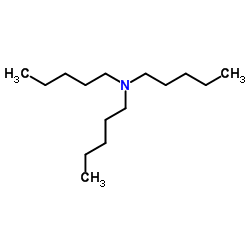


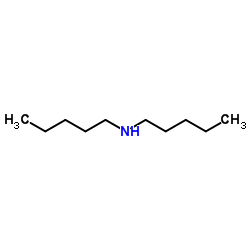
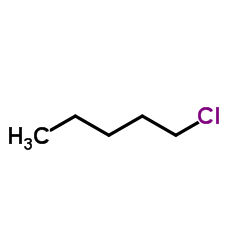

![三(1H-苯并[d][1,2,3]三唑-1-基)甲基)胺结构式](https://image.chemsrc.com/caspic/197/121238-82-2.png)

